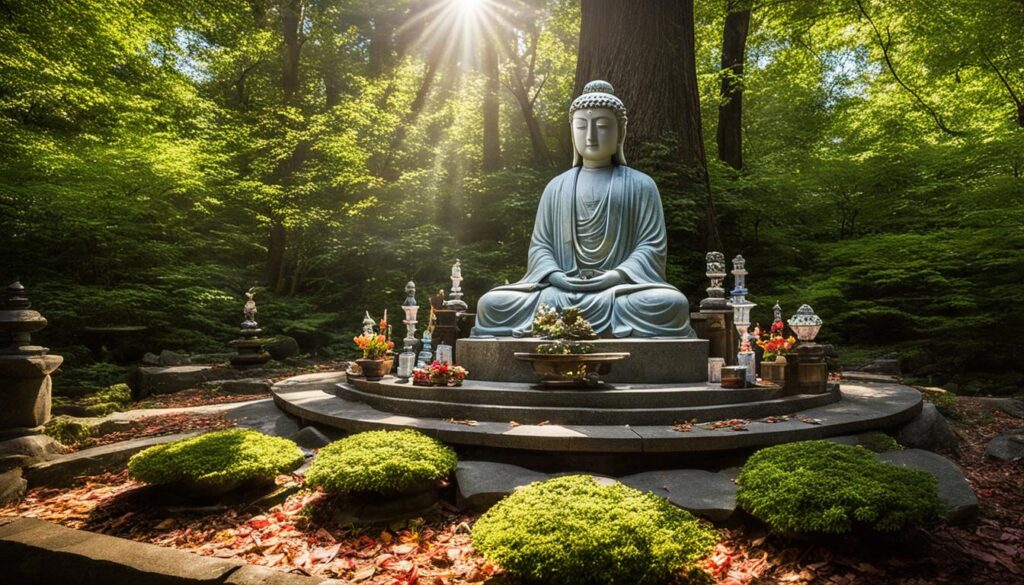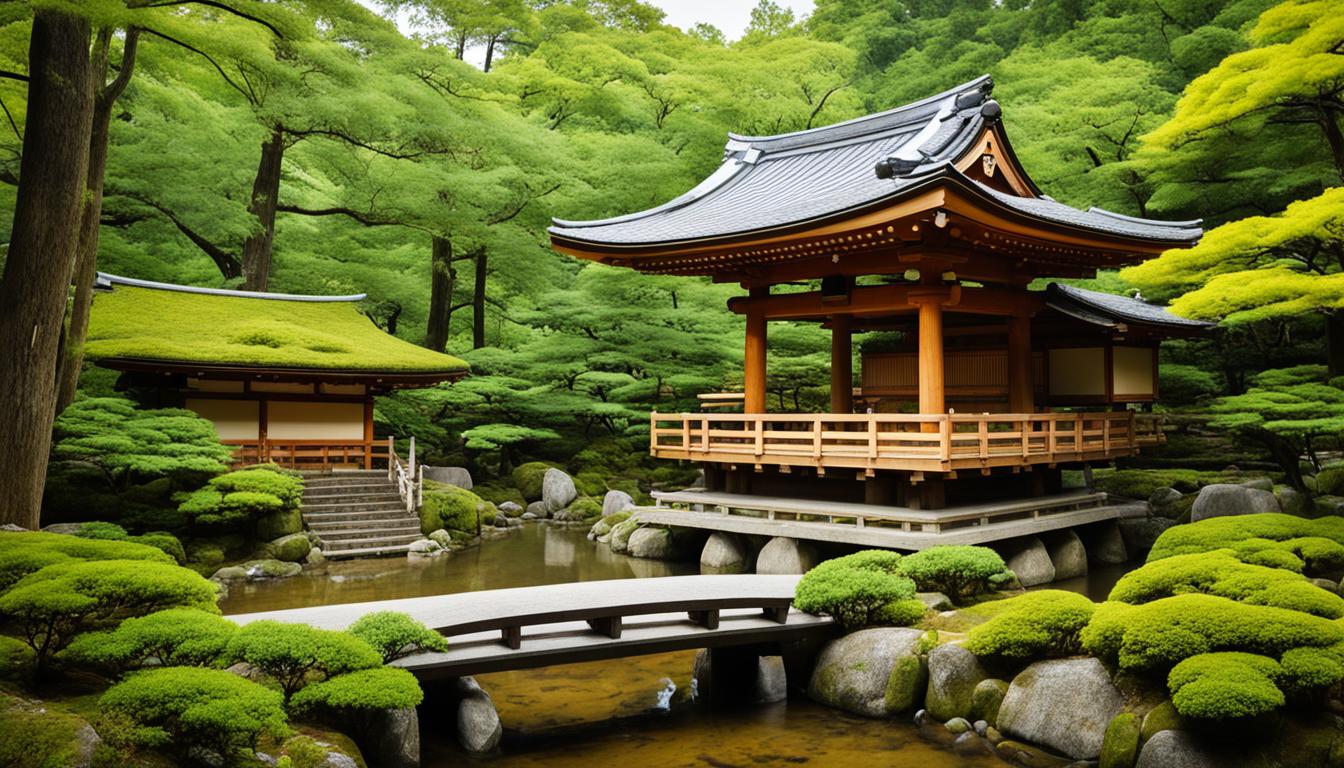Have you ever wondered if there is a belief system that celebrates imperfections and impermanence? A philosophy that emphasizes living in harmony with nature and finding balance in the world? Look no further than Shintoism, an ancient Japanese religion that weaves through the very fabric of Japanese society and culture.
Shintoism, deeply rooted in the Japanese way of life, offers a unique perspective on spirituality and the human connection to the divine. It is a belief system that embraces the imperfections and impermanence of life, celebrating them as an integral part of the journey. With its emphasis on finding harmony and reverence for nature, Shintoism provides a pathway to inner peace, personal fulfillment, and a deeper understanding of the world.
So, what are the beliefs, rituals, and practices that shape Shintoism? How does it influence the daily lives of the Japanese people? And how can embracing the spirit of Shintoism bring about personal and societal harmony?
The Principles of Shintoism
Shintoism, an ancient Japanese religion, revolves around the veneration of kami, which are gods, spirits, or ancestors believed to reside within or control various natural elements. The worship of kami is central to Shintoism and is performed at shrines scattered throughout Japan.

Shinto shrines serve as important places of pilgrimage and spiritual connection. Each shrine is dedicated to a specific kami, and individuals visit these sacred sites to offer prayers, seek guidance, and perform rituals to honor the divine presence. Shinto worship at these shrines fosters a deep sense of reverence and gratitude towards the kami.
Shinto festivities play a significant role in the practice of this religion. The annual New Year celebrations and various seasonal festivals bring communities together to express their gratitude to the kami and celebrate the cycles of nature. These festivities reinforce the bond between individuals and the divine, promoting a sense of unity and harmony.
Shinto History: Origins and Beliefs
The history of Shintoism dates back to ancient times, preceding recorded events in Japanese history. It traces its origins to the primitive polytheistic beliefs of the Japanese people, as they sought to understand their relationship with the natural world. These early beliefs evolved into a distinct religious and cultural system known as Shintoism.
Shintoism’s historical development reflects the deep connection between the Japanese people and their environment. Kami worship and the reverence for nature formed the foundation of early Shinto beliefs. Over time, Shintoism incorporated elements from Buddhism and Confucianism, further enriching its spiritual practices and rituals.
Shinto history is intertwined with the history of Japan itself. It has played a vital role in shaping Japanese culture, influencing various aspects of daily life, customs, and traditions. Shintoism continues to be a significant part of the Japanese spiritual landscape, embodying the essence of the country’s cultural identity.
The Essence of Shintoism
The essence of Shintoism lies in its emphasis on wabi-sabi, harmony with nature, reverence of kami, tranquility, and simplicity. Shintoism embraces the imperfections and impermanence of objects, celebrating them as valuable and beautiful. It teaches individuals to find beauty in the flaws and imperfections of life, transforming adversity into growth.
At its core, Shintoism encourages individuals to embrace simplicity, tranquility, and an appreciation for the natural world. It emphasizes finding balance and living in harmony with the rhythms of the universe. Shinto practices focus on cultivating sincerity, purity of heart, and gratitude in daily life, allowing individuals to connect with the divine and find inner peace.
Through the concept of wabi-sabi, Shintoism reminds us that life is imperfect and ever-changing. It encourages us to embrace these imperfections and find beauty in the transient nature of our existence. By recognizing and accepting the impermanence of life, we can cultivate a sense of tranquility and flow with the natural rhythms of the world.
In Shintoism, reverence for kami is deeply ingrained. Kami refers to the spirits or divine essences that exist in all things – nature, objects, and even people. Shintoism teaches us to respect and revere these divine beings, recognizing their presence in our daily lives. By acknowledging the inherent divinity within all things, we can develop a profound sense of interconnectedness and harmony with the world.
Appreciating the Beauty of Wabi-Sabi
The concept of wabi-sabi is central to Shintoism’s teachings on finding beauty in simplicity. It encourages us to appreciate the subtle and understated aspects of life, rather than constantly striving for perfection. Wabi-sabi teaches us that true beauty lies in the imperfections and transience of objects and experiences.
In a world that often values material possessions and external appearances, embracing wabi-sabi allows us to shift our focus to the inherent beauty that exists in all things. It invites us to cherish the fleeting moments, to find joy in the imperfect, and to cultivate gratitude for the richness of life’s tapestry.
Shintoism also emphasizes the importance of simplicity. By embracing a simpler, more minimalist lifestyle, we can free ourselves from the distractions and complexities of modern life. This simplicity allows us to cultivate a greater sense of tranquility and inner peace. It encourages us to let go of unnecessary attachments and appreciate the beauty of what truly matters.

| Aspect of Shintoism | Description |
|---|---|
| Wabi-Sabi | Embraces imperfections and impermanence, finding beauty in simplicity. |
| Harmony with Nature | Encourages living in harmony with the natural world and its rhythms. |
| Reverence of Kami | Recognizes the divine essence in all things and fosters reverence for kami. |
| Tranquility | Cultivates inner peace and tranquility through simplicity and acceptance. |
| Simplicity | Values a minimalist lifestyle and appreciation for the beauty of what truly matters. |
Shintoism and Modern Challenges
As we navigate the complexities of the modern world, Shintoism offers valuable insights for addressing the challenges we face and achieving personal and societal harmony. At its core, Shintoism promotes mindfulness and compassion, guiding us towards a path of self-awareness, empathy, and reverence for all beings.
Mindfulness, a central principle of Shintoism, encourages us to cultivate a greater awareness and appreciation for the present moment. By practicing mindfulness, we can find inner peace amidst the chaos of our busy lives. It prompts us to slow down, connect with our surroundings, and embrace the beauty of each passing moment. Through mindfulness, we can find clarity and focus, enabling us to tackle modern challenges with a calm and centered mindset.
Compassion, deeply rooted in the reverence for all things, is another essential principle of Shintoism. It encourages us to empathize with others and nurture harmonious relationships. By viewing the world through a lens of compassion, we can extend kindness, understanding, and support to those around us. Compassion not only strengthens individual bonds but also fosters a sense of social well-being and collective harmony.
Shintoism also reminds us to respect the sacredness of nature and to live in gratitude for the blessings of each moment. By reconnecting with the natural world and acknowledging its profound impact on our well-being, we can develop a sense of responsibility towards the environment. This awareness propels us to take sustainable actions and address pressing global challenges, such as climate change and ecological degradation.
In embracing the principles of mindfulness, compassion, and reverence for nature, Shintoism offers a profound path towards personal fulfillment and societal harmony. By integrating these teachings into our daily lives, we can navigate modern challenges with grace, cultivate meaningful relationships, and contribute positively to the world around us.

| Benefits of Shintoism in Addressing Modern Challenges | Actions to Cultivate Mindfulness and Compassion |
|---|---|
| 1. Enhanced self-awareness | 1. Practice meditation or mindfulness exercises |
| 2. Inner peace and reduced stress | 2. Engage in mindful activities like gardening or walking in nature |
| 3. Improved mental clarity and focus | 3. Engage in acts of kindness towards others |
| 4. Stronger empathy and understanding | 4. Volunteer or support charitable causes |
| 5. Harmonious relationships | 5. Cultivate gratitude for the simple joys in life |
| 6. Sense of responsibility towards nature | 6. Adopt sustainable practices in daily life |
Shintoism and Japanese Spirituality
Shintoism holds immense cultural significance in Japan, representing the core of Japanese spirituality. Although Japan has become increasingly modern and agnostic, Shintoism continues to influence the subconscious attitudes, customs, and lifestyles of the Japanese people. Its teachings are deeply embedded in Japanese society and shape the way individuals think and live.
Shintoism encourages a profound connection to nature, a respect for others, and a focus on the present moment. It provides a spiritual framework for Japanese spirituality, guiding individuals in finding harmony with the divine, the natural world, and their fellow human beings.
The Cultural Significance of Shintoism
Shintoism is deeply ingrained in the fabric of Japanese culture, influencing various aspects of daily life. Its principles are manifested in art, architecture, literature, and even technology. This cultural significance reinforces the sense of identity and collective conscience among the Japanese people, fostering a deep respect for tradition and a reverence for the natural world.
| Cultural Influence | Examples |
|---|---|
| Art and Literature | Shinto motifs and themes are commonly depicted in traditional paintings, sculptures, and literary works, reflecting the spiritual connection between humans and nature. |
| Architecture | Shinto shrines, with their distinct torii gates and wooden structures, are architectural icons that symbolize the harmonious coexistence of the divine and the natural world. |
| Festivals and Rituals | Annual festivals like the Gion Matsuri and the Setsubun celebrations are rooted in Shinto beliefs, reflecting the importance of seasonal rhythms and expressing gratitude to the kami. |
| Everyday Life | Shinto practices, such as purifying rituals and the hanging of protective omamori charms, are integrated into the daily lives of Japanese individuals, promoting spiritual well-being and a sense of inner peace. |
Shintoism’s influence on the Japanese people goes beyond religious rituals; it shapes their worldview, values, and interpersonal relationships. By adhering to the principles of Shintoism, individuals strive to find harmony within themselves, with others, and with the natural world, leading to a sense of fulfillment and contentment in life.

Conclusion
Embracing the spirit of Shintoism can lead you to a path of spirituality and personal fulfillment. With its focus on harmony, reverence for kami, and connection to nature, Shintoism offers valuable insights for navigating the complexities of life.
Shintoism’s influence on Japanese culture is profound, shaping the attitudes, rituals, and daily practices of its people. By embracing the principles of Shintoism, you can find inner peace, cultivate harmonious relationships, and gain a deeper appreciation for the beauty and sacredness of the world around you.
Through kami worship and the celebration of imperfections, Shintoism teaches us to find meaning and value in every aspect of life. It encourages us to live mindfully, with compassion towards others, and with gratitude for each moment. By incorporating Shinto beliefs into our lives, we can experience personal growth, spiritual enlightenment, and a profound sense of harmony.
FAQ
What is Shintoism?
Shintoism is an ancient Japanese religion that emphasizes the worship of kami, which can be translated as gods, spirits, or ancestors. It is a philosophy of living, deeply rooted in Japanese society, that celebrates harmony and embraces the imperfections and impermanence of life.
What role do Shinto rituals and practices play?
Shinto rituals and practices play a significant role in connecting individuals with the divine and finding balance in the world. They are performed at shrines, which house specific kami, and serve as places of pilgrimage. Shinto festivities also play a vital role in community bonding and expressing gratitude to the kami.
What is the history of Shintoism?
The history of Shintoism dates back to ancient times and can be traced to the primitive polytheistic beliefs of the Japanese people. Its origins predate recorded events in Japanese history and are deeply rooted in their attempts to understand their relationship with the natural world.
What is the essence of Shintoism?
The essence of Shintoism lies in its emphasis on wabi-sabi, a concept closely related to harmony with nature and the reverence of kami. It encourages individuals to embrace simplicity, tranquility, and the appreciation of the natural world, finding beauty in the flaws and imperfections of life.
How can Shintoism address modern challenges?
Shintoism offers valuable insights for addressing modern challenges by emphasizing mindfulness and compassion. Mindfulness cultivates greater awareness and appreciation for the present moment, while compassion fosters harmonious relationships and social well-being.
What is the cultural significance of Shintoism in Japan?
Shintoism represents the core of Japanese spirituality and deeply influences the attitudes, customs, and lifestyles of the Japanese people. Its teachings are deeply embedded in Japanese society and shape the way individuals think and live, promoting a profound connection to nature and a focus on the present moment.
How can embracing the spirit of Shintoism benefit individuals?
Embracing the spirit of Shintoism can lead to personal fulfillment and a deeper understanding of the world. By finding harmony with the divine, the natural world, and their fellow human beings, individuals can find inner peace, cultivate harmonious relationships, and gain a deeper appreciation for the beauty and sacredness of life.

